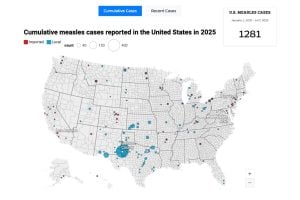Lauren Gardner is the Alton and Sandra Cleveland Professor in the Department of Civil and Systems Engineering at Johns Hopkins Whiting School of Engineering and holds a joint appointment in the Bloomberg School of Public Health. She is also a member of the Data Science and AI Institute. She is the creator of the interactive web-based dashboard used by public health authorities, researchers, and the general public around the globe to track the COVID-19 Pandemic. The dashboard debuted on January 22, 2020, and since has recorded more than 200 billion feature requests, which are the number of interactions visitors have with the underlying data available on the site.
One of six Johns Hopkins experts who briefed congressional staff about the novel coronavirus outbreak during a Capitol Hill event in early March 2020, Gardner was named one of TIME’s 100 Most Influential People of 2020 for “democratizing data” and filling “a void of public health leadership” during the pandemic. She and her team have been featured in a number of top-tier media outlets, from the Washington Post and CNN to CBS and NBC News. She also won the 2024 Merck Future Insight Prize and the 2022 Lasker~Bloomberg Public Service Award, America’s top medical research prize.
Gardner is a specialist in modeling Infectious Disease Risk. Her work focuses holistically on Virus Diffusion as a function of climate, land use, human behavior, mobility and other contributing risk factors. Along these lines, Gardner leads COVID-19 modeling efforts in partnership with U.S. cities to develop customized models to estimate COVID-19 risk at the local level, and to optimize resource allocation for surveillance and targeted testing. Her group also contributes weekly COVID-19 case and death predictions to the CDC’s ensemble forecast through the COVID-19 Forecast Hub.
Gardner has received research funding from U.S. organizations including the National Institute of Health, National Science Foundation, NASA, and CDC, as well as various Australian federal funding organizations. She has published around 100 scholarly articles, letters, communications, and conference proceedings, and supervises a research group of PhD students and post docs. Gardner is an invited member of multiple international professional committees, and reviewer for top-tier journals and grant-funding organizations. She is an invited participant of various scientific advisory committees, including the U.S. Transportation Research Board committees on Network Modeling, Transportation and Health, and Aviation Security and Emergency Management. She has supervised more than 30 students and post-docs, and teaches undergraduate- and graduate-level courses on network modeling and transport systems at Johns Hopkins.
Gardner was named to WITI’s Women in Technology Hall of Fame in 2024 and included on BBC’s 100 Women List 2020: Women who led change; was named one of Fast Company’s Most Creative People in Business for 2020; was on the Baltimore Sun’s 25 Women to Watch list, 2020; and was among the Baltimore Business Journal’s Best in Tech 2020. She was also a winner of the 2020 Route Fifty Navigator Award, which honors individuals and teams who, while working with or in state, county, or municipal governments, demonstrate their ability to implement a great idea that improves public sector services and the communities they serve.
Prior to joining JHU in 2019, Gardner was a senior lecturer in civil engineering at the University of New South Wales (UNSW) Sydney, in Australia. She received her BSArchE in architectural engineering, her MSE in civil engineering, and her PhD in transportation engineering at the University of Texas at Austin.



